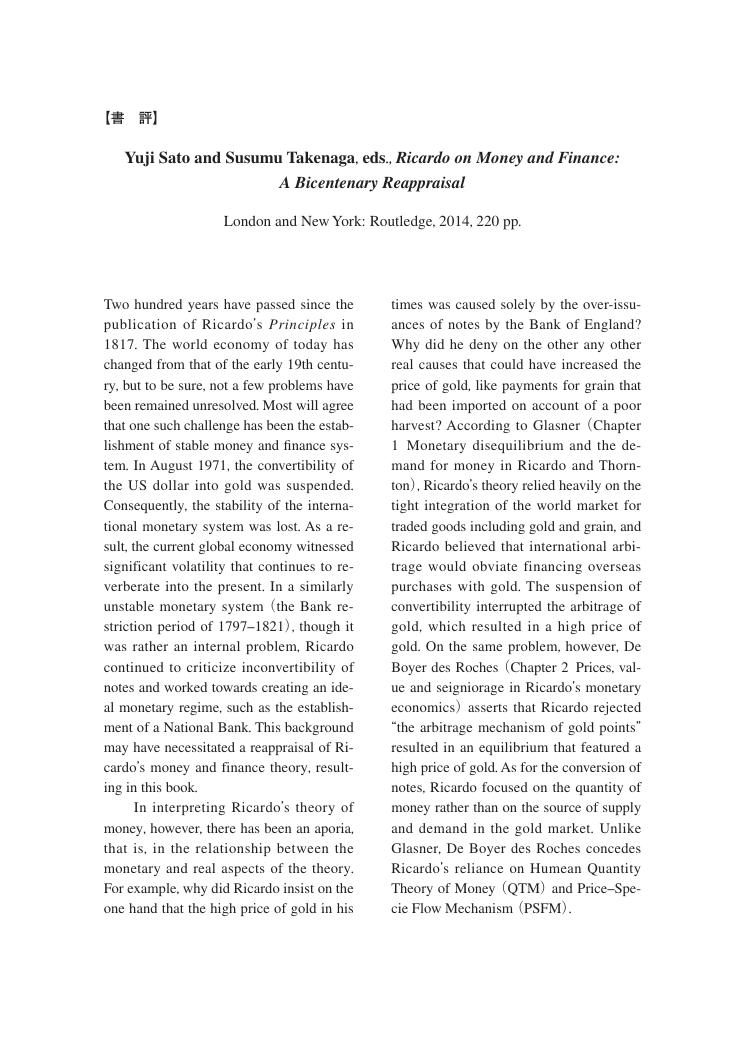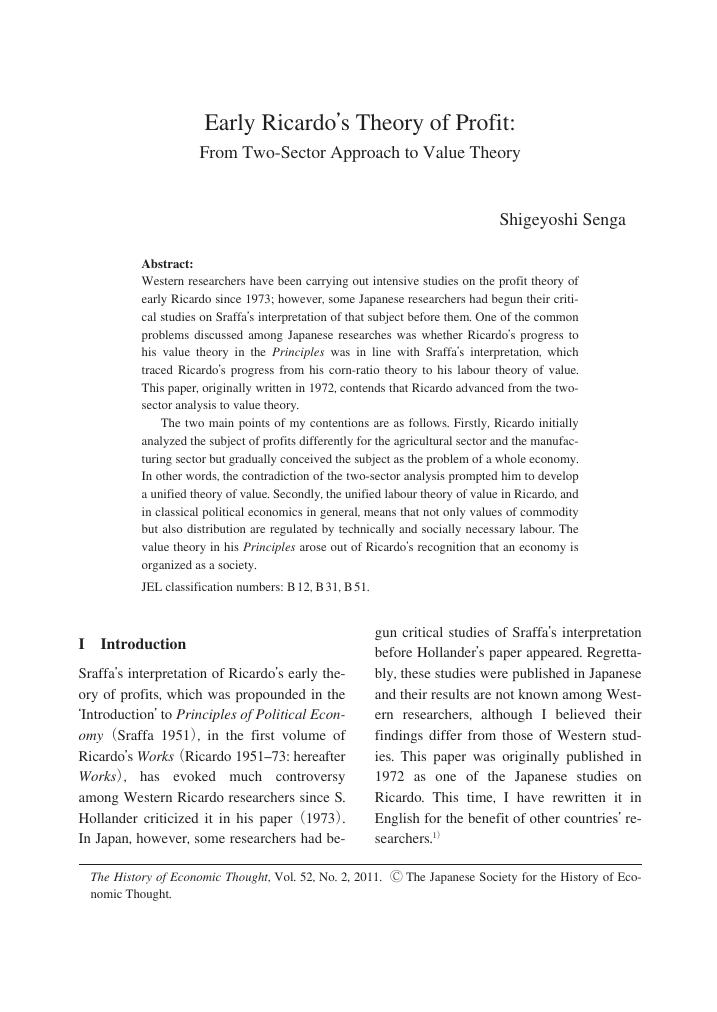- 著者
- 千賀 重義
- 出版者
- 経済学史学会
- 雑誌
- 経済学史学会年報 (ISSN:04534786)
- 巻号頁・発行日
- vol.38, no.38, pp.172-173, 2000 (Released:2010-08-05)
- 著者
- 千賀 重義
- 出版者
- The Japanease Society for the History of Economic Thought
- 雑誌
- 経済学史研究 (ISSN:18803164)
- 巻号頁・発行日
- vol.59, no.2, pp.1-18, 2018 (Released:2019-09-02)
Abstract: The focus of this paper is the wars in Europe from the middle of the seventeenth century to the early nineteenth century and their relationship with contemporary economics1 (limited to England and Scotland). As for the relationship between war and economy, there has been the accepted view that war may arise due to particular economic interests. While it is true that early mercantilists saw foreign trade and war as inseparable, major economists in this period did not find a cause for war in economy. Economists wrestled with the practicalities of fi-nancing war, such as the tax reform, but as public loans were enlarged for the expenditure of war, warned against mercantilist wars and the bankruptcy of the state. Smith and Tucker had different opinions about the independence of the American colonies, and Malthus and Ricar-do disputed the causes of the recession that followed the Napoleonic Wars. The economists of this era, although considering war as a political matter, continued to look for ways to evade war. The issue of war as a struggle for supremacy between states was expected to be replaced by efforts to strengthen commercial and industrial competitiveness in the free trade market. JEL classification numbers: B 11, B 12, N 45.
- 著者
- 羽鳥 卓也 千賀 重義 Robert Chapeskie
- 出版者
- The Japanease Society for the History of Economic Thought
- 雑誌
- 経済学史研究 (ISSN:18803164)
- 巻号頁・発行日
- vol.59, no.2, pp.118-161, 2018 (Released:2019-09-02)
- 被引用文献数
- 1
Introduction by Ken Mizuta and Shigeyoshi Senga The text of which this is a translation is Chapter 4 of Takuya Hatori (1922-2012)ʼs Kotenha Keizaigaku no Kihon Mondai (The Fundamental Question of Classical Economics), Tokyo: Miraisha, 1972. It had originally been published as an article with the same Japanese title, but Hatori gave it the slightly different English title ʻRicardoʼs theory of value and distribution in his Essay on Profitsʼ in Fukushima Universityʼs Sho―gaku Ronsyu― (The Journal of Commerce, Eco-nomics and Economic History), 34 (3), 91-151, 1965, and then added some re-visions, in particular a ʻtotal rewriteʼ of Section 5, when it was included in the book cited above. Before the publication of the article just noted, Hatori had presented a report entitled ʻEarly Ricardoʼs theories on distributionʼ at the 29th Annual Conference of the Japanese Society for the History of Economic Thought held in September 1965 at the Otaru University of Commerce, and ac-cording to the postscript of the original article ʻin substance this included the content of this text up to Section 4.ʼ Hatori states that he wrote the article after having given his presentation and considered the criticisms it elicited. Hatori began his academic work in the field of Japanese economic history but later shifted his region of research to the broad range of economic thought, from figures such as John Locke and Jean-Jacques Rousseau in the era of the civil revolution to classical economists in the eighteenth and early nineteenth centuries. Above all, he devoted his energies to study of British classical econo-mists like Adam Smith, Thomas Robert Malthus, and David Ricardo. Hatori particularly concentrated his efforts on the examination of Ricardoʼs economics.
- 著者
- 千賀 重義
- 出版者
- 経済学史学会
- 雑誌
- 経済学史研究 (ISSN:18803164)
- 巻号頁・発行日
- vol.59, no.1, pp.113-114, 2017 (Released:2019-10-12)
- 著者
- 千賀 重義
- 出版者
- The Japanease Society for the History of Economic Thought
- 雑誌
- 経済学史研究 (ISSN:18803164)
- 巻号頁・発行日
- vol.58, no.2, pp.45-47, 2017 (Released:2019-11-30)
- 著者
- 千賀 重義
- 出版者
- The Japanease Society for the History of Economic Thought
- 雑誌
- 経済学史研究 (ISSN:18803164)
- 巻号頁・発行日
- vol.57, no.1, pp.1-24, 2015 (Released:2019-08-27)
Abstract: This paper seeks to examine Takuya Hatoriʼs research on classical economics, clarify his main findings, and appraise their intellectual and historical significance. Hatoriʼs personal his-tory as a scholar of classical economics was largely divided into two periods based on the differences in the objects, methods, and results of his study. In the first half of his research activities, he addressed the problem of the relation between bourgeois revolution and mercan-tilist economics to illuminate the historical meanings of classical economics. Following Yoshihiko Uchidaʼs suggestions, Hatori grasped the mercantilist period in England after the Glorious Revolution of 1688 as a kind of social and political crisis of the country and identi-fied the role of Adam Smithʼs economics as presenting the solution to this crisis. Hatori went on to focus on the classical theories of capital accumulation and argued that classical eco-nomics was formed historically with economistsʼ visions growing and changing by way of recognizing the civil and civilized development of the capitalist economy. In the latter half of his life, Hatori devoted himself to analyzing the theories of classical economics. He spoke of “a working hypothesis which should be positioned as the starting point for our work” and claimed that classical economists presupposed “pure capitalism” when formulating and presenting their economic theories. According to Hatori, Smith, Mal-thus, and Ricardo all struggled to solve “fundamental problems” owing to this supposition about pure capitalism. In his study of Ricardoʼs theory, Hatori argued that Ricardo maintained the theory of absolute value and grasped rent as a nominal value. Indeed, through a detailed investigation of the documents in the Works of Ricardo, Hatori may have even become the first scholar in the world to criticize Piero Sraffaʼs interpretation of the corn-ratio theory. It is difficult to speculate as to why Hatori, in the latter half of his career, changed his approach to the study of classical economics. It appears that he gradually liberated himself from the influence of Uchida and felt more affinity with the economics of Kozo Uno. As the background of intellectual change, we might refer first to the success of Japanese capitalism without realizing the ideal of “civil society” and second to the “student protests” in the late 1960s. JEL classification numbers: B11, B12, B31.
1 0 0 0 OA Early Ricardo's Theory of Profit:
- 著者
- 千賀 重義
- 出版者
- The Japanease Society for the History of Economic Thought
- 雑誌
- 経済学史研究 (ISSN:18803164)
- 巻号頁・発行日
- vol.52, no.2, pp.27-45, 2011 (Released:2019-08-20)
1 0 0 0 OA 中村廣治『リカードウ評伝――生涯・学説・活動』(昭和堂,2009年)をめぐって
- 著者
- 千賀 重義 佐藤 有史
- 出版者
- 経済学史学会
- 雑誌
- 経済学史研究 (ISSN:18803164)
- 巻号頁・発行日
- vol.52, no.1, pp.88-94, 2010 (Released:2019-08-20)
1 0 0 0 OA 根岸 隆『経済学の理論と発展』 ミネルヴァ書房,2008,vi+296 頁
- 著者
- 千賀 重義
- 出版者
- 経済学史学会
- 雑誌
- 経済学史研究 (ISSN:18803164)
- 巻号頁・発行日
- vol.51, no.2, pp.120-121, 2009 (Released:2019-08-08)
1 0 0 0 OA リカードウ研究の今後
- 著者
- 千賀 重義
- 出版者
- The Japanese Society for the History of Economic Thought
- 雑誌
- 経済学史学会年報 (ISSN:04534786)
- 巻号頁・発行日
- vol.39, no.39, pp.35-41, 2001 (Released:2010-08-05)
- 参考文献数
- 20
Future studies on Ricardo will clarify Ricardian politics as Milgate-Simson has done. Ricardo was not only an eminent economist but also a creative political scientist who advocated democracy on the basis of an analysis of class society. Other themes of studies in Ricardo will be to interpret his economic theory consistent with ‘labor value’ and ‘cost of production’ which are combined in Ricardo's writings. The key to the solution of this problem will be an accurate understanding of Ricardo's money theory.
1 0 0 0 OA 羽鳥卓也『リカードウの理論圏』, 世界書院, 1995, xii+197p.
- 著者
- 千賀 重義
- 出版者
- 経済学史学会
- 雑誌
- 経済学史学会年報 (ISSN:04534786)
- 巻号頁・発行日
- vol.34, no.34, pp.165, 1996 (Released:2010-08-05)
- 著者
- 千賀 重義
- 出版者
- 経済学史学会
- 雑誌
- 経済学史学会年報 (ISSN:04534786)
- 巻号頁・発行日
- vol.33, no.33, pp.190, 1995 (Released:2010-08-05)
1 0 0 0 OA 欧米における最近のマルクス経済学の展開
- 著者
- 千賀 重義
- 出版者
- The Japanese Society for the History of Economic Thought
- 雑誌
- 経済学史学会年報 (ISSN:04534786)
- 巻号頁・発行日
- vol.32, no.32, pp.114-120, 1994 (Released:2010-08-05)
- 参考文献数
- 20
- 著者
- 千賀 重義
- 出版者
- 経済学史学会
- 雑誌
- 経済学史学会年報 (ISSN:04534786)
- 巻号頁・発行日
- vol.25, no.25, pp.75, 1987 (Released:2010-08-05)
- 著者
- 千賀 重義
- 出版者
- The Japanese Society for the History of Economic Thought
- 雑誌
- 経済学史学会年報 (ISSN:04534786)
- 巻号頁・発行日
- vol.21, no.21, pp.59, 1983 (Released:2010-08-05)










